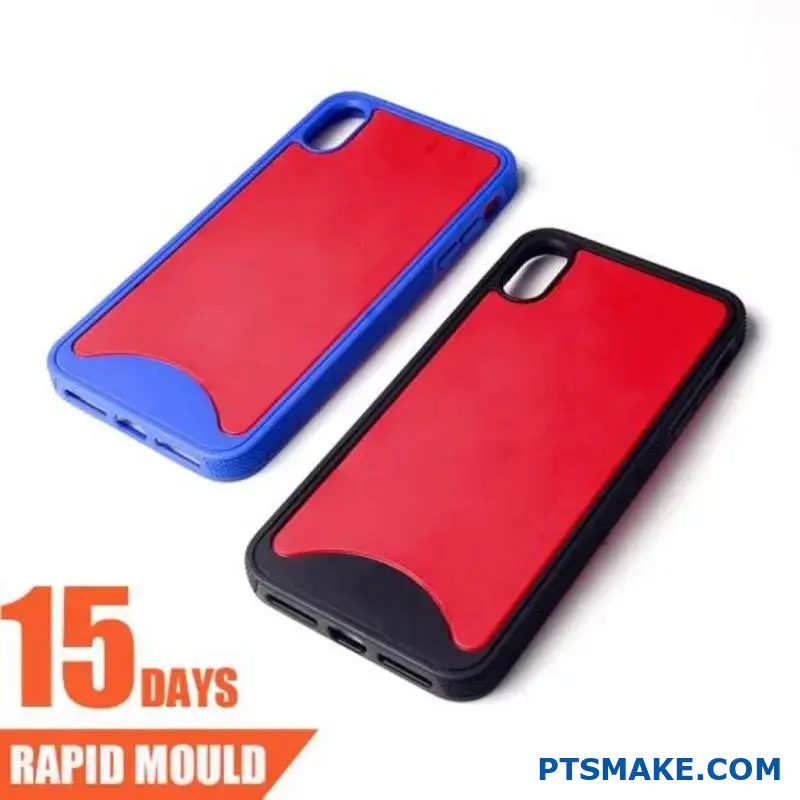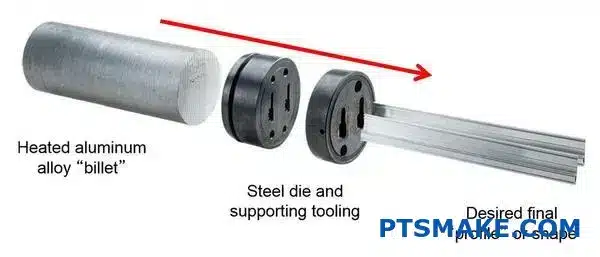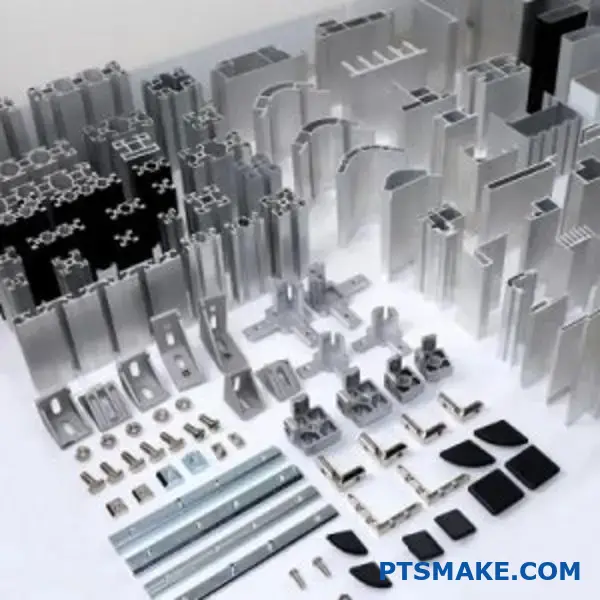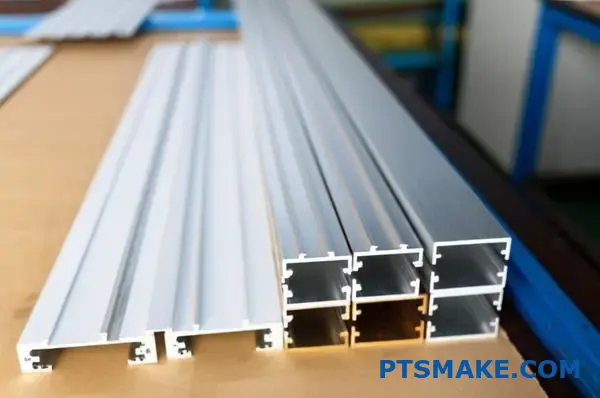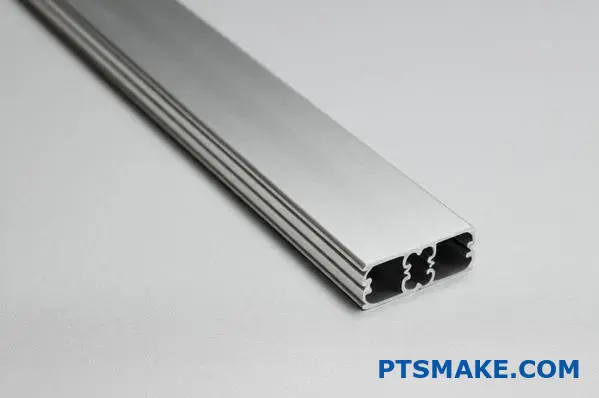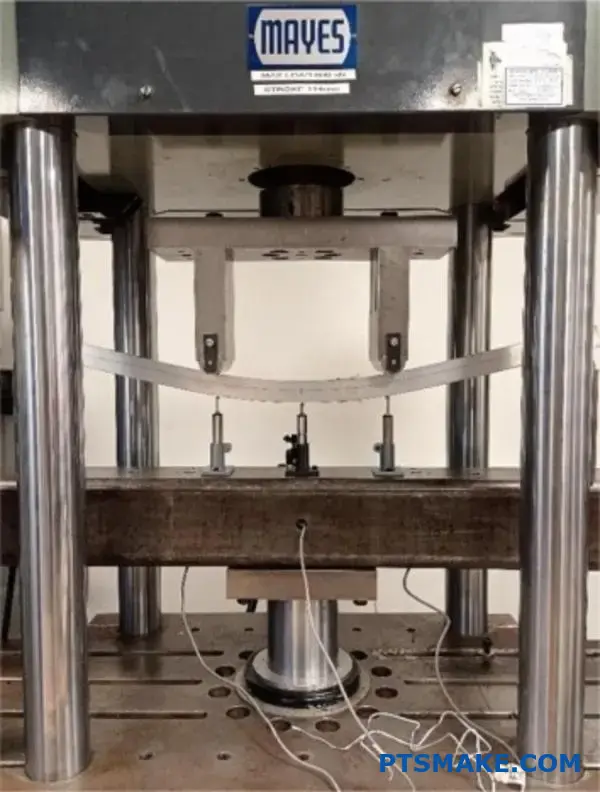What Makes a Premier Aluminum Extrusion Manufacturer
How do you spot the difference between an average supplier and a truly premier aluminum extrusion manufacturer? It’s more than just making parts; it’s about partnership and precision that elevate your entire project. Let’s explore the key distinctions.
A premier aluminum extrusion manufacturer stands out through a blend of cutting-edge technology, superior material selection, expert craftsmanship, and comprehensive end-to-end services. They consistently deliver high-precision custom profiles meeting the strictest specifications.
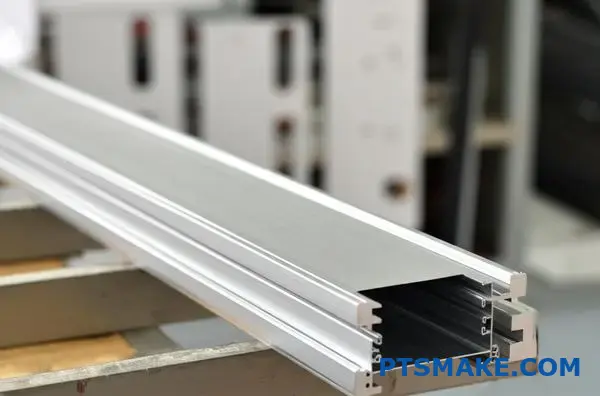
Finding the right partner for aluminum extrusion goes beyond a simple quote. It’s about identifying a manufacturer committed to excellence at every stage.
Technology and Precision
Top-tier manufacturers invest heavily in advanced extrusion presses, automation, and quality control equipment. This isn’t just about speed; it’s about achieving consistent results and tight tolerances, often measured in thousandths of an inch. In past projects, we’ve seen how precise temperature control during extrusion and cooling directly impacts the final profile’s strength and dimensional accuracy. This technological edge allows a premier aluminum extrusion manufacturer to tackle complex designs others might shy away from.
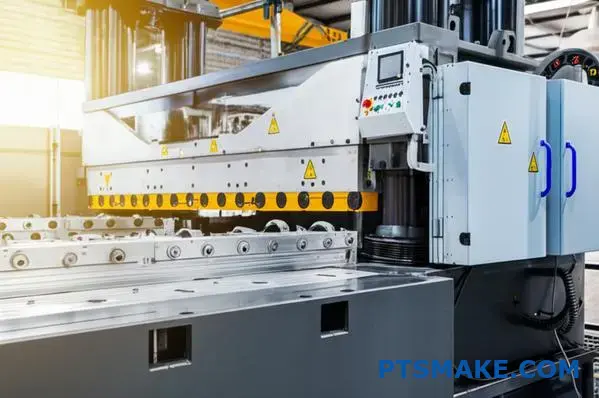
Ekspertyza materiałowa
It starts with the billet. A premier provider understands the nuances of different aluminum alloys (like 6061 vs. 7075) and helps select the optimal grade for your application’s specific needs – balancing strength, corrosion resistance, machinability, and cost. They ensure traceability and use only high-quality raw materials, which is fundamental for consistent part performance.
The Human Element: Skill and Experience
Technology alone isn’t enough. Experienced engineers and skilled operators are crucial. They understand the intricacies of die design[^1], material flow, and troubleshooting potential issues before they impact production. At PTSMAKE, while our core is CNC machining and injection molding, we deeply value this blend of tech and human expertise, knowing it’s vital across all precision manufacturing disciplines. This experience translates into better solutions and reliable outcomes for clients.
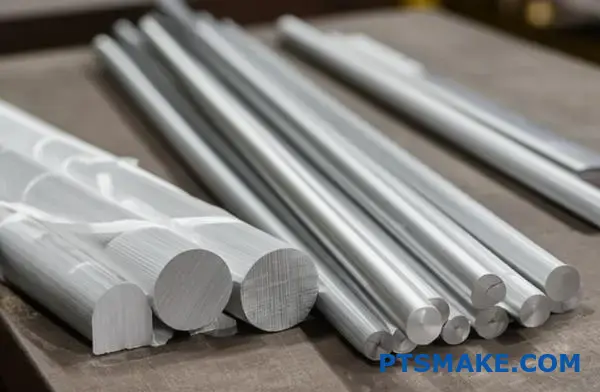
Comprehensive Service Spectrum
A key differentiator is the range of services offered. Leading manufacturers don’t just extrude metal. They provide support from initial design consultation and optimization, through extrusion, to secondary operations like precision cutting, CNC machining, surface finishing (anodizing, powder coating), and even assembly. This integrated approach simplifies the supply chain for buyers like Matthew Shekels, ensuring quality control throughout the entire process, from raw material to finished part. This holistic capability defines a true manufacturing partner.
Custom vs. Standard Aluminum Extrusion Profiles
Choosing the right aluminum profile seems simple, but it deeply impacts your project’s success, cost, and timeline. When does readily available work best, and when is investing in a unique shape the smarter move? Let’s dive in.
Standard aluminum extrusions are pre-designed shapes readily available from a manufacturer’s inventory, offering speed and lower initial costs. Custom extrusions are uniquely designed and produced for specific application needs, providing design freedom but requiring investment in new tooling.
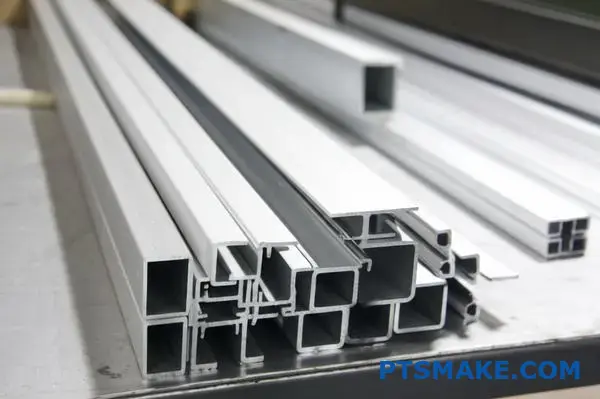
Deciding between a standard shape and a custom-designed profile often depends on balancing several key factors. An experienced Aluminum Extrusion Manufacturer can help navigate this choice, but understanding the core differences empowers you to make informed decisions early in the design process.
When Standard Profiles Make Sense
Standard profiles, like angles, channels, tubes, and beams, are the workhorses of many industries. Their primary advantages are:
- Availability: They are typically stocked or have very short lead times because the extrusion dies already exist.
- Cost-Effectiveness: No tooling costs are involved, making them ideal for budget-conscious projects or lower volumes where tooling investment isn’t justifiable.
- Proven Designs: These shapes are widely used and their structural properties are well-understood.
However, relying solely on standard profiles might mean compromising on optimal design or requiring significant post-extrusion machining, which is something we often see at PTSMAKE when adapting standard parts for precision applications.
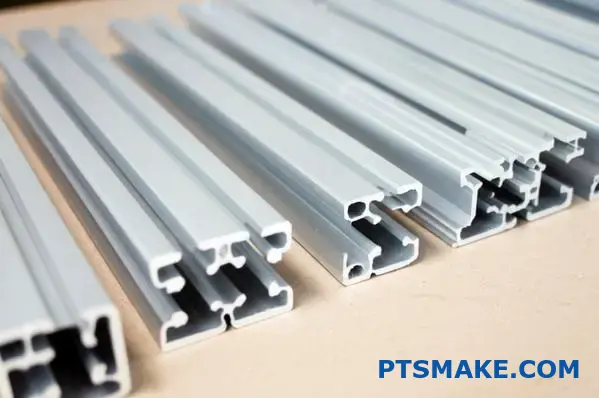
The Power of Custom Extrusions
Custom profiles are where innovation truly takes shape. They are necessary when:
- Unique Functionality is Required: The profile needs specific features, slots, or shapes to integrate seamlessly with other components, potentially reducing assembly steps.
- Performance Optimization is Critical: Tailoring the shape can improve strength-to-weight ratios or meet specific load-bearing requirements that standard shapes cannot.
- Aesthetics and Branding Matter: Custom shapes can contribute to a unique product identity.
The main considerations for custom extrusions are the initial tooling (die) cost and the lead time required for die creation and testing. However, for significant production runs, the die amortizationcan make the per-piece cost very competitive, sometimes even lower than heavily modifying a standard profile.
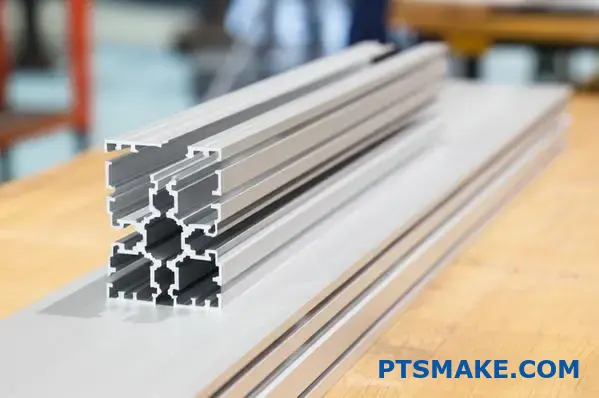
Making the Right Choice: Key Factors
Here’s a quick comparison to guide your decision:
| Cecha | Standard Profile | Custom Profile |
|---|---|---|
| Projekt | Limited to existing catalog | Tailored to specific needs |
| Koszt oprzyrządowania | Brak | Initial investment required |
| Czas realizacji | Short (often stock) | Longer (die creation + production) |
| Unit Cost | Generally lower for small volumes | Can be lower for high volumes |
| Elastyczność | Lower; may need post-machining | High; integrates features directly |
| Najlepsze dla | Simple structures, prototypes, cost-sensitive projects | Unique designs, integrated functions, high volume |
Ultimately, the best choice depends on your project’s specific requirements, budget, and volume. Consulting with a knowledgeable Aluminum Extrusion Manufacturer early on can save significant time and resources. They can assess your design and advise whether a standard, modified standard, or fully custom profile offers the best value proposition.
Specialty Fabrication Services to Look For
Your aluminum extrusion profile is just the starting point. What truly elevates a supplier is their ability to turn that profile into a component ready for your assembly line. Are you juggling multiple vendors for finishing touches?
A top Aluminum Extrusion Manufacturer offers crucial value-added fabrication services like precision cutting, drilling, punching, bending, welding, and even assembly. These capabilities streamline your process, ensuring parts arrive ready for integration.
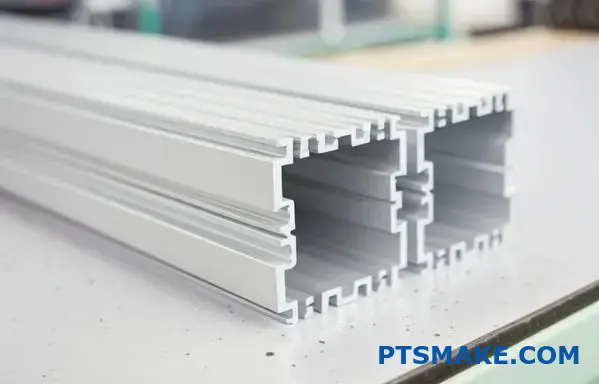
Finding an Aluminum Extrusion Manufacturer that handles more than just the initial extrusion can significantly simplify your supply chain and improve final part quality. When a single source takes responsibility for these subsequent steps, it reduces logistical complexity, minimizes potential damage from transport between vendors, and often shortens lead times. Let’s explore the key services.
Precision Cutting and Machining
Raw extrusions come in long lengths. The first step is always cutting them to the required size. But beyond simple sawing, look for manufacturers with advanced capabilities.
- CNC Cutting: Offers high precision and repeatability for length tolerances.
- Miter Cutting: For angled cuts needed in frame assemblies.
- Drilling & Tapping: Creating holes for fasteners or assembly points.
- Punching: Efficiently creating standard or custom-shaped holes or slots.
- Obróbka CNC: For more complex features like pockets, counterbores, or intricate end details that go beyond basic cutting or drilling. This ensures features are perfectly aligned with the extruded profile.
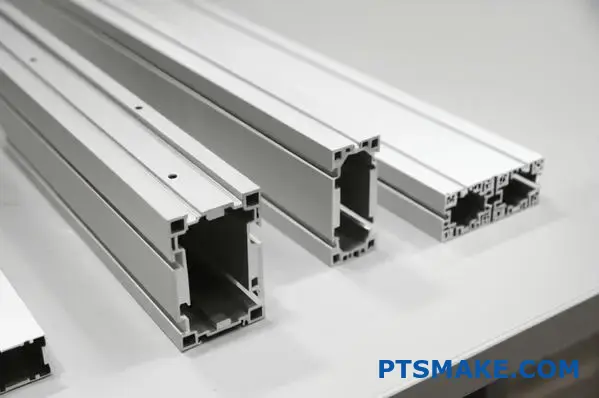
Forming and Shaping
Sometimes, the straight extrusion needs further shaping.
- Bending: Creating curves or angles along the length of the extrusion. This requires specific tooling and expertise to avoid kinking or distorting the profile. The ability to maintain tight dokładność wymiarowa1 during bending is crucial.
- Spawanie: Joining extrusions to each other or to other components. Expertise in aluminum welding (TIG or MIG) is vital for strong, clean joints without compromising the material’s properties.
Finishing and Assembly
The final touches prepare the part for its end-use.
- Surface Finishing: Includes anodizing, powder coating, painting, or polishing for corrosion resistance and aesthetics. Having this done by the extruder avoids extra handling.
- Montaż: Some manufacturers offer light assembly, such as attaching brackets, fasteners, or other components to the extrusion. This delivers a more complete sub-assembly, saving you time.
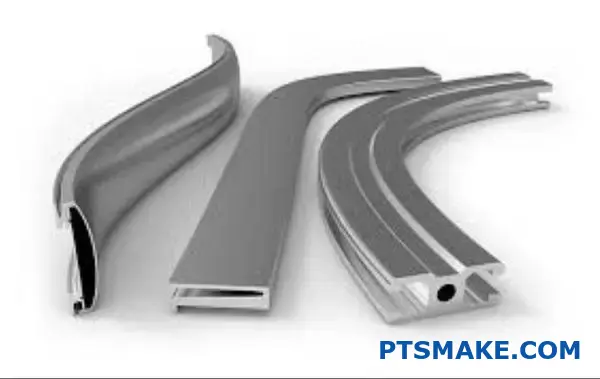
Here’s a quick look at the benefits of integrated fabrication services:
| Service | Podstawowa korzyść |
|---|---|
| Cięcie | Provides exact lengths needed for application. |
| Wiercenie | Creates precise holes for assembly/fastening. |
| Punching | Efficiently adds holes/slots. |
| Gięcie | Shapes profiles for specific design requirements. |
| Spawanie | Joins multiple pieces into a single structure. |
| Wykończenie | Enhances appearance and corrosion resistance. |
| Montaż | Delivers a more complete, ready-to-use component. |
Partnering with an Aluminum Extrusion Manufacturer offering these services in-house reduces the number of suppliers you need to manage, like the procurement challenges faced by busy managers. We understand the immense value of integrated services for streamlining production and ensuring consistent quality, which is why we champion comprehensive solutions. It means better quality control and a smoother path from raw material to finished part.
Finishing Options That Enhance Performance
Ever wonder why some aluminum parts look pristine for years while others quickly fade or corrode? The secret often lies not just in the extrusion itself, but in the final finishing touch. This step is crucial, don’t overlook it!
Choosing the right finish for your aluminum extrusions is vital for boosting durability, enhancing corrosion resistance, and achieving the desired look. Quality Aluminum Extrusion Manufacturers provide essential options like anodizing, powder coating, and mechanical finishes to meet diverse functional and aesthetic needs.
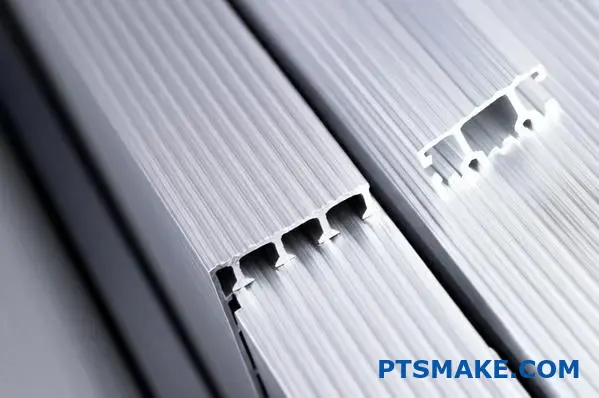
Selecting the appropriate finish goes beyond just picking a color. It’s a technical decision that impacts how your product withstands its environment and performs over time. As a partner in manufacturing, we at PTSMAKE understand that the final surface treatment is as critical as the precision of the part itself. Let’s explore some key options provided by capable aluminum extrusion suppliers.
Anodizing: The Protective Shield
Anodowanie2 is an electrochemical process that creates a hard, durable, and corrosion-resistant oxide layer on the aluminum surface. It’s essentially thickening the natural protective layer aluminum already has.
Kluczowe korzyści
This process significantly increases resistance to wear and tear, making it ideal for parts exposed to friction or harsh conditions. While clear anodizing retains the metallic look, various colors can be achieved through dyeing, offering aesthetic flexibility combined with robust protection. We’ve seen in past projects how anodized parts maintain their integrity far longer in demanding applications.
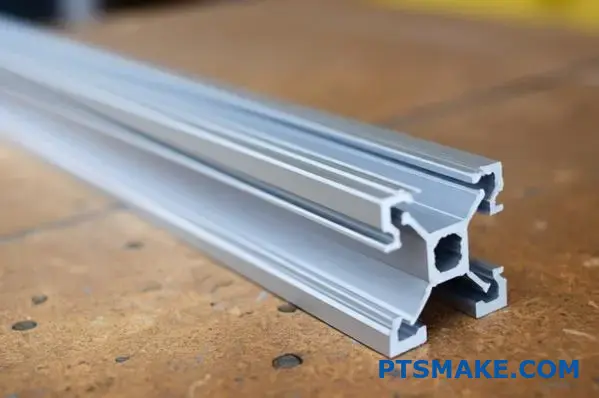
Powder Coating: Color and Durability
Powder coating involves applying a dry powder electrostatically and then curing it under heat. This creates a finish that is typically thicker and more durable than conventional liquid paint.
Versatility and Toughness
One of the biggest advantages is the vast range of available colors, textures, and gloss levels. Powder coating provides excellent resistance to chipping, scratching, and fading. It’s a go-to choice for products needing both strong visual appeal and long-lasting protection against the elements. Many clients appreciate its environmental edge too, as it typically releases fewer volatile organic compounds (VOCs) compared to liquid paints.
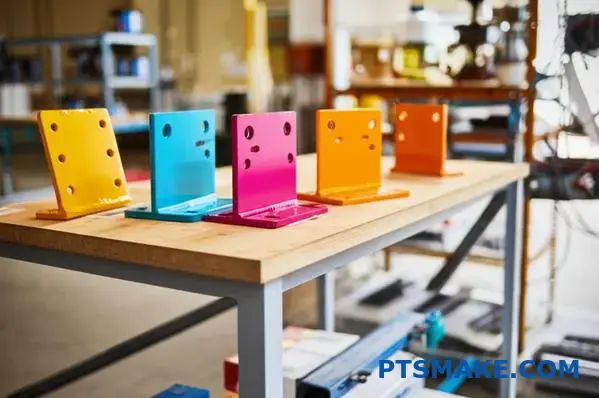
Mechanical Finishes: Texture and Appearance
Beyond coatings, mechanical finishes alter the surface texture itself.
- Brushing: Creates a distinctive directional grain pattern.
- Polishing: Achieves a smooth, highly reflective (mirror-like) surface.
- Blasting: Uses abrasives for a matte, non-directional texture.
These are often used for decorative purposes but can also prepare the surface for other treatments.
Comparing Common Finishes
Making the right choice depends on your specific needs. Here’s a quick comparison:
| Cecha | Anodowanie | Malowanie proszkowe | Mechanical (e.g., Brushed) |
|---|---|---|---|
| Trwałość | Excellent (Hardness) | Very Good (Toughness) | Varies (Aesthetic Focus) |
| Ochrona | Excellent Corrosion/Wear | Good Corrosion/Impact | Minimal Protection |
| Color Range | Moderate, Metallic Look | Very Wide, Various Textures | Surface Texture Change |
| Cost Guide | Średni | Średni | Niski do średniego |
Consulting with your Aluminum Extrusion Manufacturer early in the design phase helps ensure you select the finish that provides the best balance of performance, appearance, and cost for your specific application.
Industry-Specific Aluminum Extrusion Applications
Think about the sleek frame of a solar panel, the intricate heat sink in your laptop, or the sturdy window frames in a skyscraper. What do they have in common? Often, it’s meticulously designed aluminum extrusions, each uniquely suited for its job.
Aluminum extrusions are incredibly versatile, forming the backbone of products across automotive, construction, electronics, and renewable energy sectors. A skilled Aluminum Extrusion Manufacturer adapts profiles, alloys, and tolerances to meet the specific performance demands of each industry.
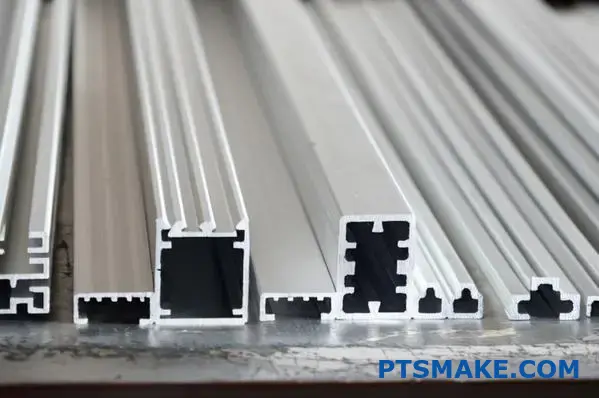
The true magic of aluminum extrusion lies in its adaptability. The same basic process can yield profiles optimized for lightweight strength in a car, thermal management in electronics, or weather resistance on a building façade. Let’s explore how these adaptations happen.
Motoryzacja i transport
In the automotive world, every gram counts. Aluminum extrusions are champions of lightweighting, helping vehicles improve fuel efficiency and handling.
- Structural Components: Frames, subframes, and crash management systems use complex hollow profiles made from high-strength alloys (like 6xxx or 7xxx series) for optimal strength-to-weight ratios.
- Battery Enclosures: Electric vehicles rely on extrusions for strong, lightweight, and thermally conductive battery housings.
- Trim and Decorative Elements: Extrusions provide sleek, corrosion-resistant finishes for both interior and exterior trim.
An experienced Aluminum Extrusion Manufacturer works closely with automotive engineers to design profiles that meet stringent safety and performance standards.
Budownictwo i architektura
The building industry heavily utilizes aluminum extrusions for their durability, low maintenance, and design flexibility.
- Window and Door Frames: Extruded profiles (often 6063 alloy) create weather-tight seals and allow for thermal breaks to improve energy efficiency.
- Curtain Walling and Facades: Complex interlocking profiles enable stunning glass facades on large buildings, providing structural support and aesthetic appeal.
- Structural Systems: Trusses, beams, and support structures leverage aluminum’s strength and corrosion resistance, especially in challenging environments.
The ability to extrude intricate shapes allows architects immense creative freedom.
Electronics and Thermal Management
Miniaturization and heat dissipation are key challenges in electronics. Aluminum extrusions offer excellent solutions.
- Heat Sinks: Extruded profiles with complex fin designs maximize surface area for efficient heat dissipation from processors and power components. Specific alloys with high thermal conductivity are selected.
- Enclosures and Housings: Strong, lightweight, and easily machinable extrusions form protective casings for sensitive electronic devices. The finish often needs to provide electrical insulation or specific aesthetic qualities.
- Frames and Mounts: Used within servers, racks, and other electronic assemblies for structural support. The final material temper3 is crucial for ensuring the required strength after any secondary machining.

Renewable Energy
Aluminum extrusions are fundamental to the green energy revolution, particularly in solar power.
- Solar Panel Frames: Lightweight yet strong frames (typically using 6005 or 6063 alloys) protect photovoltaic panels and allow for easy mounting. Corrosion resistance is vital for decades of outdoor exposure.
- Mounting Systems: Extruded rails and brackets create versatile and durable structures for rooftop or ground-mounted solar arrays. Custom profiles are often developed for specific installation requirements.
Here’s a quick overview of how extrusion characteristics align with industry needs:
| Przemysł | Key Requirement | Typical Alloy Series | Typowe zastosowania |
|---|---|---|---|
| Motoryzacja | Strength-to-Weight, Safety | 6xxx, 7xxx | Frames, Battery Housings, Trim |
| Budowa | Durability, Weather Resist. | 6063, 6061 | Window/Door Frames, Facades, Structures |
| Elektronika | Thermal Conduct., Precision | 6063, 6061, 1xxx | Heat Sinks, Enclosures, Mounts |
| Renewable Energy | Corrosion Resist., Strength | 6005, 6063, 6061 | Solar Panel Frames, Mounting Systems |
Working across various sectors at PTSMAKE, primarily in CNC machining and injection molding, has given me a deep appreciation for how material properties and precise manufacturing techniques must align perfectly with the end application’s demands. This principle holds especially true for aluminum extrusions, where partnering with a knowledgeable Aluminum Extrusion Manufacturer ensures the final profile delivers exactly the performance required for its specific industrial context.
Lead Times and Supply Chain Considerations
Waiting for parts can stall your entire project. How can you accurately predict delivery times for aluminum extrusions, especially custom ones, and keep your production line moving smoothly? Let’s break down the timelines and how to manage them.
Understanding and managing lead times for aluminum extrusions involves knowing typical production cycles, factors like die creation and finishing influence schedules, and implementing effective communication and planning with your Aluminum Extrusion Manufacturer.
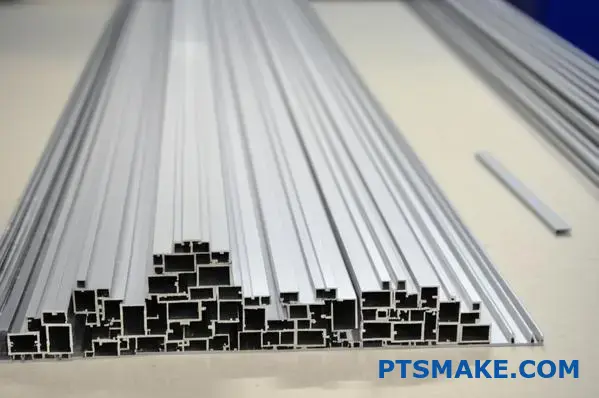
Navigating the supply chain for custom components like aluminum extrusions requires foresight. Unexpected delays can ripple through your entire production schedule, impacting costs and time-to-market. Based on our experience managing complex manufacturing projects at PTSMAKE, proactive planning and clear communication are key.
Understanding Typical Lead Times
Lead times for aluminum extrusions vary significantly based on several factors. It’s crucial to differentiate between standard and custom profiles:
- Standard Profiles: These often have the shortest lead times, potentially just 1-2 weeks or even available from stock, as the extrusion dies already exist and are frequently used.
- Custom Profiles: These require a new extrusion die to be designed, manufactured, tested, and approved. This initial tooling phase alone can take several weeks (typically 3-6 weeks, but sometimes longer for very complex designs). Once the die is ready, the actual extrusion and any subsequent finishing or fabrication add more time. A reasonable estimate for a new custom extrusion might range from 6 to 12 weeks, depending on complexity and finishing.
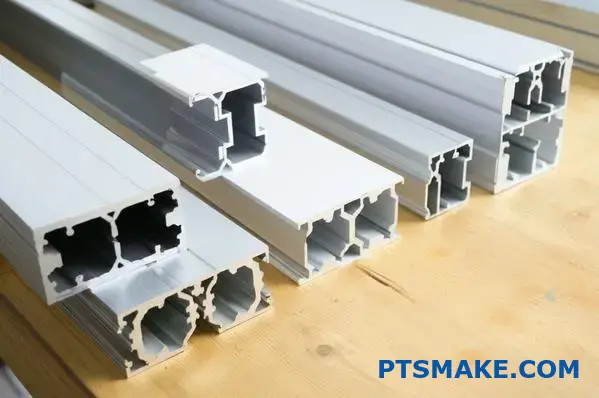
Factors Influencing Production Schedules
Several elements can impact how quickly you receive your parts:
Die Complexity and Creation
As mentioned, creating a new die is often the longest single step for custom orders. Intricate profile designs require more complex, and thus time-consuming, die manufacturing and testing. Existing dies might also need maintenance or repair, which can introduce delays.
Dostępność materiałów
While aluminum is common, specific alloys or billet sizes might have longer procurement times, especially during periods of high demand or supply chain disruption. Confirming material availability early is vital.
Press Schedules and Capacity
An Aluminum Extrusion Manufacturer’s workload directly impacts lead times. Their extrusion presses operate on schedules, and your order needs to fit in. High demand can lead to longer queues. Some manufacturers may offer expediting4 services, but this usually comes at a premium cost.
Operacje dodatkowe
Simple cut-to-length extrusions will be faster than those requiring extensive CNC machining, multiple finishing steps (like anodizing and painting), or assembly. Each additional step adds time for processing, handling, and quality checks.
Ilość zamówienia
While counterintuitive, very small custom runs might sometimes have longer relative lead times because the setup time for the die and press is significant compared to the short production run. Larger runs benefit from economies of scale once production starts but naturally take longer overall to produce the full quantity.

Strategies for Effective Supply Chain Management
Managing lead times effectively requires collaboration and planning:
- Engage Early: Discuss your project with potential Aluminum Extrusion Manufacturers as early as possible, even during the design phase. They can provide realistic time estimates and suggest design modifications that might simplify tooling or production.
- Zapewnienie jasnych specyfikacji: Ensure all drawings, tolerances, finish requirements, and quantities are clearly defined upfront to avoid delays caused by clarifications or rework.
- Factor in Buffers: Build realistic buffer times into your overall project schedule. Don’t rely on the absolute best-case scenario lead time.
- Maintain Open Communication: Regularly communicate with your supplier for updates on production status. Good manufacturers will be proactive in alerting you to potential delays. At PTSMAKE, we know trust makes everything simple, and that starts with honest communication.
- Consider Blanket Orders or Forecasting: If you have ongoing needs, providing forecasts or placing blanket orders can help the manufacturer plan capacity and material procurement, potentially shortening lead times for subsequent releases.
Here’s a simplified look at potential lead time contributors:
| Etap | Typical Time Range (Estimate) | Key Factors Influencing |
|---|---|---|
| Die Design & Creation | 3-6+ Weeks (Custom Only) | Complexity, Manufacturer Load |
| Material Procurement | 1-3 Weeks | Alloy Specificity, Availability |
| Extrusion & Cutting | 1-2 Weeks | Press Schedule, Quantity |
| Finishing/Fabrication | 1-4 Weeks | Process Type, Complexity |
| Total Custom (New) | 6-12+ Weeks | Sum of above stages |
| Standard Profile | 1-3 Weeks | Stock/Existing Die |
Note: These are general estimates and can vary widely.
Ultimately, partnering with a reliable Aluminum Extrusion Manufacturer who values transparency and collaboration is your best strategy for navigating lead times and ensuring your supply chain runs effectively.
Evaluating Quality Control and Certification
Imagine receiving a large batch of custom aluminum extrusions, only to discover they don’t meet the critical tolerances for your assembly. It’s a costly setback. That’s why understanding how a manufacturer approaches quality isn’t just important, it’s absolutely essential for project success.
A reputable Aluminum Extrusion Manufacturer demonstrates commitment through robust quality control systems, including ISO certifications, precise dimensional verification using advanced tools, and thorough material testing to guarantee extrusions consistently meet your exact specifications.
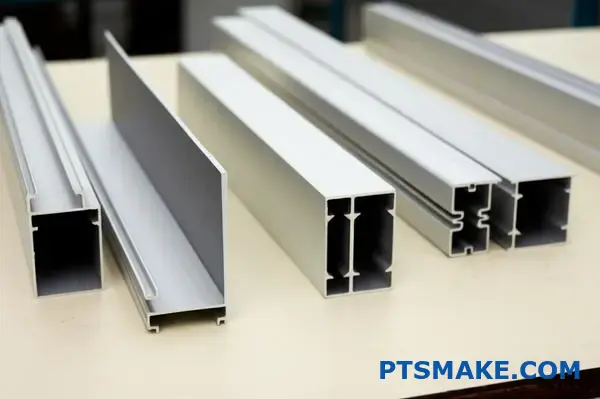
When you partner with an Aluminum Extrusion Manufacturer, you’re trusting them with a critical component of your product. Verifying their quality control processes and certifications is non-negotiable. It’s the bedrock upon which reliable manufacturing rests. Let’s break down what to look for.
The Framework: Quality Management Systems (QMS)
A structured approach to quality is often formalized through a Quality Management System.
ISO 9001 Certification
This is the most recognized international standard for QMS. Holding an ISO 9001 certification indicates that the manufacturer has established and follows documented procedures for key processes, emphasizes customer satisfaction, and is committed to continuous improvement. While not the only indicator, it shows a serious commitment to repeatable quality. It provides assurance that processes are in place to catch errors before they reach you.
Verifying the Shape: Dimensional Verification
Aluminum extrusions often require tight tolerances for proper fit and function. How does a manufacturer ensure they meet your specs?
Techniki pomiarowe
Leading manufacturers use a combination of tools:
- Calipers and Micrometers: For basic, quick checks of key dimensions.
- Coordinate Measuring Machines (CMMs): For highly accurate 3D measurements of complex profiles.
- Optical Comparators/Scanners: To verify intricate profile shapes against design drawings.
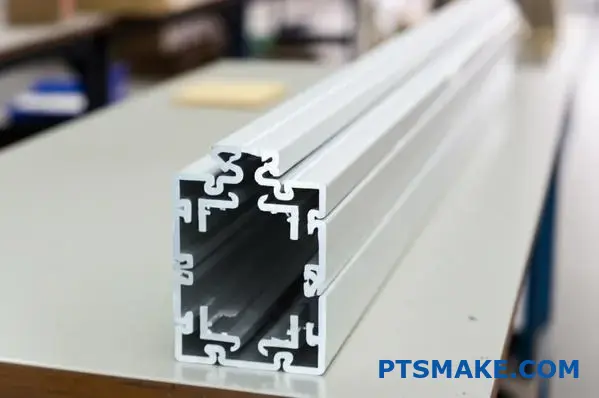
Consistent dimensional accuracy prevents assembly issues downstream, saving time and money. In past projects, we’ve seen how even slight deviations can halt a production line.
Confirming the Substance: Material Testing
The right aluminum alloy with the correct properties is crucial for performance. Verification is key.
Ensuring Alloy Specifications
Manufacturers should have processes to verify incoming raw materials and confirm the final product meets the required mechanical properties. Common tests include:
- Hardness Testing: Checks the material’s resistance to indentation, indicating proper temper.
- Tensile Testing: Measures strength and ductility.
- Spectrometry5: This technique accurately confirms the elemental composition of the aluminum alloy, ensuring you received the exact grade (e.g., 6061 vs 6063) you specified.
Here’s a quick look at common checks:
| Quality Check Type | Cel | Importance Level |
|---|---|---|
| ISO 9001 Certification | Confirms standardized process control | Wysoki |
| Dimensional Checks (CMM) | Verifies complex geometry and tight tolerances | Wysoki |
| Material Composition Test | Ensures correct alloy grade and properties | Wysoki |
| Kontrola wzrokowa | Catches surface defects, finish inconsistencies | Średni |

At PTSMAKE, our core values include telling the truth and building trust; robust quality control is how we live those values in manufacturing, ensuring we exceed specifications. Choosing an Aluminum Extrusion Manufacturer with transparent and rigorous quality control provides peace of mind and guarantees the performance of your final product.
How to Select the Right Manufacturing Partner
Picking the cheapest supplier might seem smart initially, but what hidden costs could surface later? Choosing the right Aluminum Extrusion Manufacturer involves evaluating much more than just the price tag to ensure your project’s success and avoid potential headaches down the road.
Selecting the ideal Aluminum Extrusion Manufacturer requires evaluating technical expertise, communication responsiveness, design support capabilities, verified quality systems, and their commitment to being a reliable long-term partner beyond the initial quote.
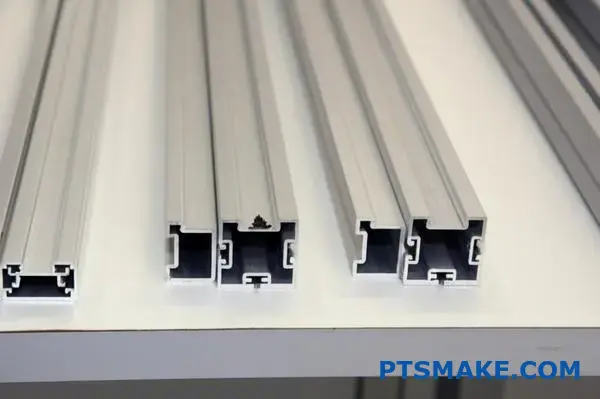
Finding the right partner isn’t just about getting parts made; it’s about building a relationship that supports your goals from concept to completion. Price is a factor, certainly, but it shouldn’t overshadow critical capabilities and reliability. Let’s look beyond the bottom line.
Możliwości techniczne
Does the manufacturer have the right equipment and expertise for your specific needs? Look for modern extrusion presses, precision cutting tools, and experience with the alloys your project requires. Can they handle complex profiles and maintain tight tolerances consistently? In past projects, we’ve seen that a partner’s ability to understand and execute intricate designs saves significant time and prevents costly revisions later. Their technical depth is a direct reflection of the quality you can expect.
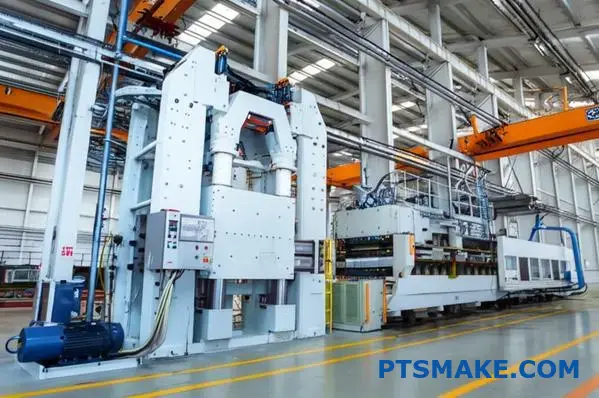
Obsługa klienta i komunikacja
How responsive and helpful is the potential partner? Prompt answers to questions, clear communication about lead times, and proactive problem-solving are crucial. You need a partner who acts like an extension of your team. At PTSMAKE, we firmly believe "trust makes everything simple," and that starts with transparent, consistent communication. If a potential supplier is hard to reach or vague during the quoting process, imagine managing production issues with them.
Design Assistance (DfM)
A great Aluminum Extrusion Manufacturer can often provide Design for Manufacturability (DfM) feedback. They might suggest subtle profile tweaks that simplify extrusion, reduce tooling costs, or improve the part’s functionality without compromising your design intent. This collaborative approach shows they are invested in your project’s success, not just fulfilling an order. Understanding potential issues like tolerance stacking6 early can prevent major assembly problems.

Quality Standards and Verification
Don’t just take their word for it; verify their commitment to quality. Do they have certifications like ISO 9001? What are their inspection processes? Ask about their equipment for dimensional verification (like CMMs or optical scanners) and material testing procedures. Consistent quality is vital, especially for engineers like Matthew Shekels who rely on precise components.
Long-Term Reliability
Consider the manufacturer’s stability and track record. Are they financially sound? Do they have positive testimonials or case studies? A reliable partner is one you can count on for repeat orders and potentially scale with as your needs grow. Look for a company that values long-term relationships over short-term gains.
Here’s a quick evaluation checklist:
| Evaluation Factor | Key Questions to Ask | Znaczenie |
|---|---|---|
| Możliwości techniczne | Do they have the right equipment/expertise for my complexity/alloy? | Wysoki |
| Obsługa klienta | Are they responsive, clear, and proactive in communication? | Wysoki |
| Design Assistance (DfM) | Do they offer suggestions to optimize the design for manufacturing? | Średni |
| Quality Systems | What certifications (ISO 9001?) and inspection methods do they use? | Wysoki |
| Reliability | What is their track record, stability, and focus on long-term partnerships? | Wysoki |
Choosing the right Aluminum Extrusion Manufacturer is a strategic decision. By looking beyond price and carefully evaluating these key factors, you significantly increase your chances of a successful outcome and a smooth production process.
Learn how maintaining precise measurements after forming impacts final assembly and function. ↩
Click to understand this electrochemical process and its benefits for aluminum. ↩
Discover how heat treatment alters aluminum’s strength and workability for specific uses. ↩
Learn about the process of accelerating an order, often involving additional costs or schedule adjustments. ↩
Learn how this technique precisely identifies the chemical composition of aluminum alloys. ↩
Understand how individual part tolerances accumulate in an assembly and impact fit. ↩


